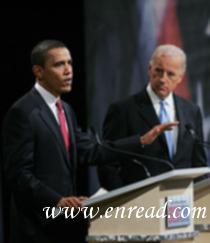美国新总统奥巴马入主白宫后做的第一件事便是宣布白宫工作人员需要遵守的一系列新的道德准则,其中包括冻结白宫高层工作人员的薪水,更加严格地限制游说团体的作用,并限制他们向政府公务员提供礼品。在向他的白宫团队发表讲话时,奥巴马说透明和法治将是美国总统府的基石,要使政府更加诚实和公开。

President Barack Obama's first public act in office Wednesday was to institute new limits on lobbyists in his White House and to freeze the salaries of high-paid aides, in a nod to the country's economic turmoil1.
Announcing the moves while attending a ceremony in the Eisenhower Executive Office Building to swear in his staff, Obama said the steps "represent a clean break from business as usual."
The pay freeze, first reported by The Associated Press, would hold salaries at their current levels for the roughly 100 White House employees who make over $100,000 a year. "Families are tightening2 their belts, and so should Washington," said the new president, taking office amid startlingly bad economic times that many fear will grow worse.
Those affected3 by the freeze include the high-profile jobs of White House chief of staff, national security adviser4 and press secretary. Other aides who work in relative anonymity5 also would fit into that cap if Obama follows a structure similar to the one George W. Bush set up.
Obama's new lobbying rules will not only ban aides from trying to influence the administration when they leave his staff. Those already hired will be banned from working on matters they have previously6 lobbied on, or to approach agencies that they once targeted.
The rules also ban lobbyists from giving gifts of any size to any member of his administration. It wasn't immediately clear whether the ban would include the traditional "previous relationships" clause, allowing gifts from friends or associates with which an employee comes in with strong ties.
The new rules also require that anyone who leaves his administration is not allowed to try to influence former friends and colleagues for at least two years. Obama is requiring all staff to attend to an ethics7 briefing like one he said he attended last week.
Obama called the rules tighter "than under any other administration in history." They followed pledges during his campaign to be strict about the influence of lobbyist in his White House.
"The new rules on lobbying alone, no matter how tough, are not enough to fix a broken system in Washington," he said. "That's why I'm also setting rules that govern not just lobbyists but all those who have been selected to serve in my administration."
In an attempt to deliver on pledges of a transparent8 government, Obama said he would change the way the federal government interprets the Freedom of Information Act. He said he was directing agencies that vet9 requests for information to err10 on the side of making information public — not to look for reasons to legally withhold11 it — an alteration12 to the traditional standard of evaluation13.
Just because a government agency has the legal power to keep information private does not mean that it should, Obama said. Reporters and public-interest groups often make use of the law to explore how and why government decisions were made; they are often stymied14 as agencies claim legal exemptions15 to the law.
"For a long time now, there's been too much secrecy16 in this city," Obama said.
He said the orders he was issuing Wednesday will not "make government as honest and transparent as it needs to be" nor go as far as he would like.
"But these historic measures do mark the beginning of a new era of openness in our country," Obama said. "And I will, I hope, do something to make government trustworthy in the eyes of the American people, in the days and weeks, months and years to come."
 收听单词发音
收听单词发音 



